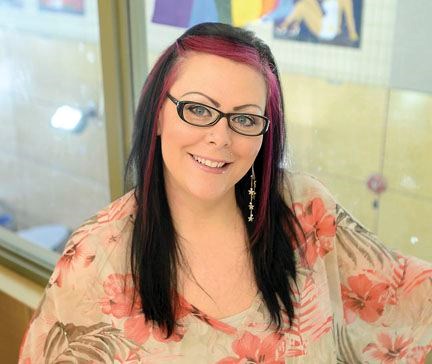When Sue Trabant walks into schools across District 57, she sees the subtle signs of inclusivity.
It's in a rainbow-coloured rug in the classroom, in the posters that show a diversity of families and in the words of teachers she's worked with who now feel more comfortable speaking about LGBTQ (lesbian, gay, bisexual, transgender and questioning) issues.
Trabant, a College Heights Secondary teacher, became the district's "inclusivity teacher" soon after the February 2014 LGBTQ policy was approved by the board, promising "a safe and positive environment for all students, families and employees, including those who self-identify as LGBTQ."
For Trabant, fundamentally this fight has always been about human rights and it's a role she's occupied in her school's halls for years. Now she has what amounts to an hour each day dedicated to widening her reach to the district's borders.
"It's been really busy," she says of her first year on the job, which mostly targets other teachers' ability to deal with LGBTQ rights and issues that crop up in schools.
"They need to be addressed and we need to be making our buildings safe and inviting for all people," Trabant. "We need to be able to walk into our schools and know we belong there.
"Homophobia and transphobia is based on fear."
Her role is also focused on encouraging ways to reach vulnerable students directly. Now, all of Prince George's high schools have Queer Straight Alliances, something she hopes to see move into elementary schools.
"It's been shown statistically that if students can make one connection to a school, whether it's through a program, whether it's through sports, or it's one particular person in the building, that can be enough to keep them in school," says Trabant, who did her thesis on how those relationships improve graduation rates.
"That's all it's about, making that one connection with students."
Belonging also means students see themselves reflected in the day-to-day classroom experiences.
"If you're going to read a story in kindergarten, read a story about all families," Trabant suggests. "If you're making a math question, include all types of people."
The district took that advice to heart two years ago and sought out learning material that better reflected the diverse families in the community. But those resources had to be approved by the Educational Resource Acquisition Consortium, said Cindy Heitman, district principal of learning innovations.
"We submitted a rather large list," Heitman says. "So as a result other districts are moving those books into their schools."
Heitman notes each school is different and the learning environment should reflect a reality "specific to the culture of the building."
"I think the kids are feeling safer in our schools as well, just more opportunities to be themselves."
District 57 is one of the rare regions that has devoted staff hours to achieving its inclusivity goals.
"Even with the creation of my job it put us in a leader status," says Trabant, who recently started a two-year certificate as a sexual health educator, offered for the first time in the north.
Trabant is a leader in the province, too. She's a facilitator for the BC Teachers' Federation, which brought on a brand new workshop on gender inclusivity in school environment. She's also worked as the Social Justice chair for the Prince George District Teachers' Association.
A year in and Trabant has visited most schools or in cases like Mackenzie, she's had Skype sessions so the conversations still happen.
She's most excited about an upcoming after-school session this month available to teachers across the district focussed entirely on training and development.
"Mostly this job was created to be able to educate teachers to give them the kind of vocabulary and communication resources so they could be doing this kind of stuff in classrooms themselves and build their confidence," she says. "Even to be comfortable to use the vocabulary can be daunting."
The language is constantly shifting, she says, compounded by simply knowing how and when to correct a student on hurtful language can be a difficult.
"Sometimes people don't interject because they don't know how to or they're not sure how to deal with it or they're not even sure if it is homophobic."
The epithet "that's gay" is still common in schools.
"You could just interject by saying 'That's probably not gay. It probably doesn't have the ability to choose a sexual orientation.'"
It's become such a part of youth culture that often it becomes a matter of explaining why a term is hurtful when they don't give it a second thought, Trabant says.
"They're using terms that they're hearing, not really understanding what it is that they mean, not really understanding the effect that that can have on other people in a building."
Addressing transgender violence and phobia is a key issue for Trabant.
"There's a lot of fear and anxiety around working with trans people for the general population because there hasn't been a lot of education out there," says Trabant, but even that is changing.
The goal is to pass the education from her to the teachers to the students.
"As teachers we would love to be able to snap our fingers and put a stop to it but really we can't - it's up to them. It's about educating them so that they know if they don't change, it's not going to change."



